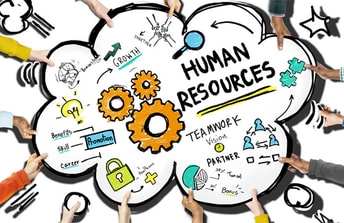Welcome to (TTDA London) Training and Teaching Development Academy, UK.

Human Resource Management
Human Resources Management plays a strategic role and a prominent position in the organizational structure. However, the location of this site differs from one organization to another for several factors, the most important of which are:
1. The organization's management style and the extent of understanding the vital role played by human resources management.
2. The number of workers in the organization.
3. The general organizational structure of the organization in which the Human Resources Department operates.
Accordingly, human resources management can be defined:
It is the performance of events and activities that are planning, organizing, developing and leading, and it is the department concerned with motivating employees to reach the highest level of productivity efficiently and effectively and bringing the company and the employee together towards contributing to achieving the goals of each of them as well as contributing to increasing and maintaining the company's market share.
The human resources department aims to:
1. Contribute to achieving the company's goals.
2. Recruitment of highly trained and motivated skills and competencies.
3. Increasing job satisfaction and self-realization of employees.
4. Communicate HR policies to all employees of the organization.
5. Contribute to maintaining behavioral policies and work ethics.
6. Managing and controlling the “change” process to benefit both the organization and the employee.
7. Seek to achieve the equation of the level of good performance, which is ability and desire, as the increase in ability is represented in training and development programs for workers, while increasing desire is represented in incentive systems and health and safety programs.
The main functions of the Human Resources Department are:
Develop a strategy that is derived and in line with the overall strategy of the organization and in line with the organization's vision, mission and goals so that it includes the work and development of human resource management systems that include performing the following functions and tasks:
• Job Analysis
• Job description
• Recruitment and Selection system
Performance Appraisal System
Compensation and Benefits System
• Human Resources Development
• Motivation and Incentives
• Human Resources Planning • Human Resources Planning
• Establishing powers and responsibilities • Authorities and Responsibilities
• Developing and updating organizational structures
• Development of safety regulations • Health and Safety
• Study and address employee problems • Employee Problem Solving
The most important factors that highlighted the importance and role of human resources management:
1. Discover the importance of the human element.
2. The size and growth of the organization and the number of employees.
3. The emergence of trade unions and their impact on the employee's situation and work systems.
The importance of human resources in the organization stems from being the most important elements of the productive process in it, and good competencies that are capable of outstanding performance and giving must be available.
Therefore, it can be said that the expansion of production is not only by horizontal expansion "an increase in the number of employees and a high technology of machinery and equipment", but that the vertical expansion of production is complementary to horizontal expansion by raising the level of productive efficiency by providing highly motivated human resources for formation, qualification and training.
Keep up-to-date with the latest news, Courses and updates by subscribing to our newsletter.
Add your comments